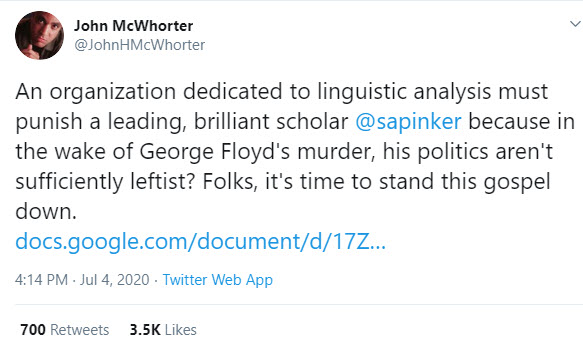The National Association of Scholars was founded and funded by conservatives back in 1987, long before Trump hijacked what was left of the traditional conservative movement. Despite its conservative origins and leanings, the Mission Statement of NAS is one that I can generally support. I don't consider myself to be a "conversative" or "liberal." I consider my positions on each political issue separately, a la carte. Party politics has no bearing on what I think about an issue. I am writing about NAS because I believe it is offering important information and narratives to the public. In this article, NAS expresses its grave concern that Cancel Culture is chilling speech at the academy, which clashes with what is arguably the prime directive of education.
NAS has taken a strong stance in opposition to Cancel Culture and in favor of open and vigorous discussion of issues at universities. NAS is also compiling a chart of numerous incidents involving teachers who have been disciplined or fired for expressing their opinions (and sometimes for expressing facts) both in the classroom and outside of the classroom. This list includes summaries of the incidents. I have reviewed independent detailed reports about some of these cases, so that I know that some of the NAS summaries seem fair, but I do not claim to be independently informed about the facts of most of the cases on the list.
All organizations that stand up for the importance of free speech recognize that protected speech is not always easy to protect. For instance consider the position of the ACLU, which famously represented nazis on a free speech in the Skokie case:
Protecting free speech means protecting a free press, the democratic process, diversity of thought, and so much more. The ACLU has worked since 1920 to ensure that freedom of speech is protected for everyone.
It is important to protect speech for the greater long-term good, even when some infringements involve speech that is unpopular, wrong-headed or seemingly deplorable. NAS makes this explicitly clear:
To be sure, some of the aforementioned statements are unsavory and may be worthy of institutional discipline. But the vast majority are not. And yet, woke higher education bureaucrats show an eager willingness to placate the angry students and professors insisting that “justice” be served. Meanwhile, “cancelees” have their professional reputations permanently sullied and, in many cases, ruined.
Here are the stated aims of NAS:
Our Mission
The National Association of Scholars upholds the standards of a liberal arts education that fosters intellectual freedom, searches for the truth, and promotes virtuous citizenship.
Our Ideals
The standards of a liberal arts education that the NAS upholds include reasoned scholarship and civil debate in America’s colleges and universities; and individual merit in academic and scholarly endeavor. We expect that ideas be judged on their merits; that scholars engage in the disinterested pursuit of the truth; and that colleges and universities provide for fair and judicial examination of contending views.
We expect colleges to offer coherent curricula and programs of study. We uphold a view of institutional integrity that includes financial probity as well as transparency in the curriculum and classroom. We uphold the principles of academic freedom that include faculty members’ and students’ freedom to pursue academic research; their freedom to question and to think for themselves; and their freedom from ideological imposition.
We expect colleges and universities to prioritize education as academia’s main purpose. And we understand education in our time and place to entail providing students with a breadth of understanding of core subjects including Western civilization and American history. We recognize that the vitality of American education arises in large part out of the freedom of colleges and universities to experiment and to offer diverse curricula. That robust diversity, however, must be anchored in respect for the abiding ideals of the pursuit of the truth and the cultivation of virtuous citizenship.
I invite you to Google the facts of some of these cases on the NAS list to see whether you are also concerned that speech is being chilled in classroom such that the overall mission of colleges and universities is being threatened.


